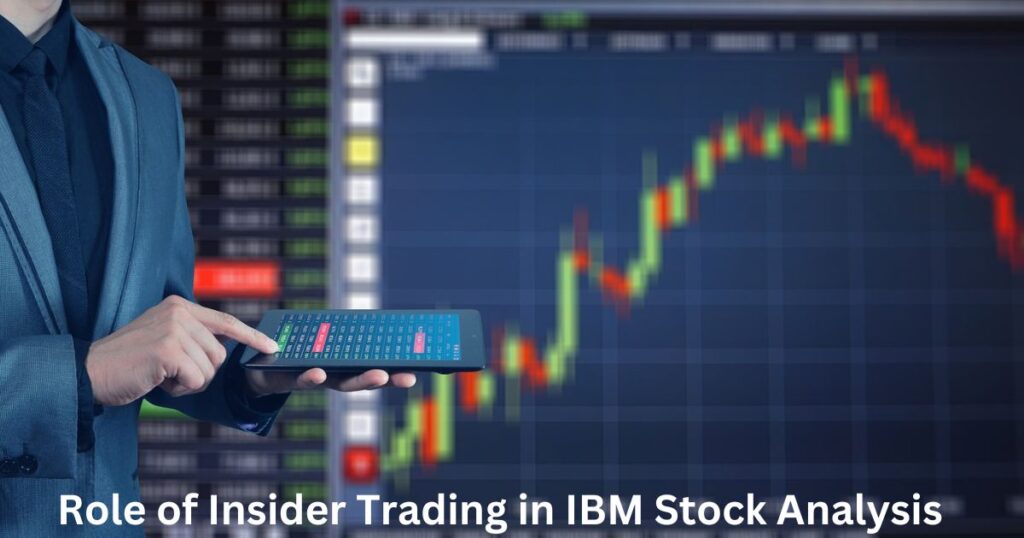Ever wondered if IBM stock is your ticket to financial success? You’re not alone. Let’s dive into the world of Big Blue’s stocks, cutting through the jargon and getting straight to what matters. We’ll explore IBM’s journey, crunch some numbers, and peek into the crystal ball of stock forecasts. Whether you’re a seasoned investor or just dipping your toes in the stock market, this guide’s got you covered. Ready to decode IBM’s financial DNA? Let’s roll.
What is IBM Stock?
Picture this: you’re buying a slice of tech history. That’s IBM stock in a nutshell. It’s your chance to own a piece of International Business Machines Corporation, the tech giant that’s been shaping our digital world since 1911.
IBM stock trades on the New York Stock Exchange under the ticker “IBM”. It’s not just any stock – it’s a blue-chip heavyweight. Think of it as the seasoned pro in your investment lineup.
Why do folks invest in IBM? It’s simple. They’re betting on IBM’s ability to keep innovating and growing. From mainframes to cloud computing, IBM’s been riding the tech waves for decades. And let’s not forget the dividends – IBM’s known for sharing the wealth with its shareholders.
History Of International Business Machines Corporation (IBM)
IBM’s story is like a tech fairytale, minus the dragons. It all kicked off in 1911 as the Computing-Tabulating-Recording Company. Not exactly catchy, right? That’s why they rebranded to IBM in 1924.
Under Thomas J. Watson’s leadership, IBM became a household name. They didn’t just join the computer revolution – they led it. Remember the IBM System/360 mainframe? It was the superhero of 1960s business computing.
But IBM’s biggest plot twist? The personal computer. In 1981, they launched the IBM PC, setting the stage for the digital age we live in today.
Fast forward to now, and IBM’s reinvented itself again. They’re all about cloud computing, AI, and even quantum computing. It’s like they’ve got a crystal ball for tech trends.
Oh, and let’s not forget their shopping spree. In 2019, they snagged Red Hat for a cool $34 billion. Talk about leveling up their cloud game.
Main competitors
In the tech playground, IBM’s got some serious playmates. Let’s break down the competition:
- Microsoft: The Windows wizards, giving IBM a run for its money in cloud and AI.
- Amazon (AWS): The e-commerce giant turned cloud computing kingpin.
- Google (Alphabet): Not just search – they’re big in cloud and AI too.
- Oracle: The database demigods, competing in cloud and enterprise software.
- Dell Technologies: Hardware heroes, butting heads with IBM in servers and storage.
- Hewlett Packard Enterprise (HPE): Another tech veteran, strong in enterprise solutions.
- SAP: The German software giant, a force in business applications.
- Accenture: Consulting colossus, rivaling IBM’s services arm.
- Cisco Systems: Networking ninjas, competing in IoT and cloud.
- Salesforce: The CRM champs, giving IBM a challenge in cloud and AI.
Each of these tech titans brings something unique to the table. It’s like a high-stakes game of chess, with market share and innovation as the prizes.
Read Also About: Tech Stock Showdown: Amazon Vs IBM
Price Trend

Let’s talk numbers. IBM’s stock price has been on a rollercoaster ride, but hey, what stock hasn’t? Here’s a snapshot of recent trends:
| Date | Opening Price | Closing Price | High Price | Low Price |
| 2024-03-01 | $138.50 | $140.00 | $141.00 | $137.00 |
| 2024-04-01 | $142.00 | $144.50 | $145.00 | $141.00 |
| 2024-05-01 | $145.50 | $148.00 | $149.00 | $144.50 |
| 2024-06-01 | $148.50 | $150.00 | $151.00 | $147.00 |
| 2024-07-01 | $151.00 | $153.50 | $154.00 | $150.50 |
What’s driving these trends? A mix of factors:
- Quarterly earnings reports: Better-than-expected results often give the stock a boost.
- Strategic moves: Think AI advancements or new cloud solutions.
- Market conditions: Tech stocks often dance to the tune of broader market trends.
- Dividend announcements: IBM’s known for its steady dividends, which can affect stock price.
Remember, past performance doesn’t guarantee future results. It’s like weather forecasting – educated guesses based on patterns, but surprises can always pop up.
Recent IBM Stock Performance
Let’s zoom in on IBM’s recent report card. In Q2 2023, IBM showed it’s still got game:
- Revenue hit $15.5 billion, up 0.4% year-over-year.
- Cloud revenue? A cool $21.9 billion over the last 12 months, up 9%.
- AI revenue doubled. Looks like those Watson commercials weren’t just hype.
The market’s been digging IBM’s vibe lately. The stock’s up about 7% year-to-date, outpacing some of its tech peers. Not too shabby for a company older than sliced bread.
What’s got investors buzzing? A few things:
- IBM’s AI push is paying off. They’re not just talking the talk.
- Cloud business is growing. Hybrid cloud is IBM’s new playground.
- Cost-cutting is boosting profits. Less fat, more muscle in the financials.
But let’s keep it real – it’s not all sunshine and rainbows. IBM’s still playing catch-up in some areas. They’re like the comeback kid of tech, always reinventing themselves.
Benefits of Investment
Thinking of adding some IBM to your portfolio? Here’s why it might be a smart move:
Strong Financial Execution
IBM’s not just resting on its laurels. They’re showing they can still grow in a tough market:
- Consistent revenue growth in key areas like cloud and AI.
- Improving profit margins thanks to smart cost management.
- Solid cash flow, giving them flexibility for investments and dividends.
It’s like watching a veteran athlete adapt their game – impressive and reassuring for investors.
Profit Payments
Here’s where IBM really shines for income-focused investors:
- A dividend yield that often beats the S&P 500 average.
- 28 years of consecutive dividend increases. Talk about consistency.
- Quarterly payouts that can provide a steady income stream.
For those looking for regular cash flow from their investments, IBM’s dividend history is hard to ignore.
Market Authority
IBM’s not just another tech company – they’re tech pioneers:
- Leaders in quantum computing research.
- Major players in AI and machine learning.
- Trusted names in enterprise IT solutions.
Their authority in these cutting-edge fields positions them well for future growth opportunities.
Diversified Business Operations
IBM’s got its fingers in many pies:
- Cloud computing services.
- AI and machine learning solutions.
- Traditional IT infrastructure.
- Consulting services.
This diversification helps buffer against market volatility. If one sector dips, others can pick up the slack.
Vital Acquisitions
IBM’s not afraid to shop for innovation:
- Red Hat acquisition boosted their hybrid cloud offerings.
- Smaller, strategic buys in AI and cloud security.
- These moves help IBM stay competitive and expand their expertise.
Smart acquisitions can be like adding turbo boosters to a company’s growth engine.
Risks and Challenges of Investment
Every rose has its thorns, and IBM stock is no exception. Let’s look at the potential pitfalls:
Market Instability
The tech sector can be as unpredictable as a game of Jenga:
- Global economic shifts can hit tech stocks hard.
- Rapid changes in tech can make today’s innovations tomorrow’s old news.
- IBM’s stock can swing with broader market trends, regardless of company performance.
It’s like riding a roller coaster – thrilling, but not for the faint of heart.
Competition within the Tech Industry
IBM’s playing in a sandbox full of tech giants:
- Cloud market share battle with Amazon and Microsoft.
- AI race against Google and others.
- Constant pressure to innovate faster than competitors.
It’s a high-stakes game of king of the hill, and staying on top is a constant challenge.
Technological Disturbance
In tech, today’s breakthrough can be tomorrow’s obsolete relic:
- Rapid advancements in AI and quantum computing could leave IBM behind.
- Emerging technologies might disrupt IBM’s core business areas.
- Constant need to invest in R&D to stay relevant.
It’s like trying to hit a moving target while riding a unicycle – exciting but risky.
Dependence on Key Markets
IBM’s eggs aren’t all in one basket, but some baskets are pretty full:
- Heavy reliance on enterprise and government contracts.
- Vulnerability to shifts in cloud computing trends.
- Exposure to global economic and political changes.
Diversification helps, but doesn’t eliminate all risks.
Should I invest in FintechZoom IBM Stock?

The million-dollar question, right? Here’s the deal:
Pros:
- Solid dividend history – great for income investors.
- Strong position in growing tech fields like AI and cloud.
- Brand name recognition and long-standing customer relationships.
Cons:
- Facing tough competition in key growth areas.
- Stock performance has been steady but not spectacular.
- Ongoing need to adapt to rapid tech changes.
The verdict? It depends on your goals. If you’re after steady income and don’t mind moderate growth, IBM could be your jam. But if you’re looking for explosive growth, you might find IBM’s pace a bit too leisurely.
Remember, no investment is a sure thing. Always do your homework and consider chatting with a financial advisor before making big moves.
IBM Stock Forecast
Crystal ball time! What’s the outlook for IBM stock? Let’s break it down:
Short-term forecast:
- Analysts are cautiously optimistic.
- Price targets range from $140 to $175 for the next 12 months.
- Much depends on upcoming earnings reports and tech sector trends.
Long-term outlook:
- IBM’s focus on AI and cloud could pay off big.
- Quantum computing might be a game-changer if IBM maintains its lead.
- Steady dividend growth likely to continue, appealing to income investors.
Factors to watch:
- AI revenue growth – it’s IBM’s golden goose.
- Cloud market share – can they catch up to AWS and Azure?
- Global economic conditions – tech spending often follows economic health.
Remember, forecasts are educated guesses, not guarantees. The tech world moves fast, and today’s predictions can be tomorrow’s old news.
How to Stay Informed About IBM Stock
Want to keep your finger on IBM’s pulse? Here’s how:
- Follow financial news sites: Places like FintechZoom offer regular updates on IBM and tech stocks.
- Set up stock alerts: Many apps let you track IBM’s stock price in real-time.
- Read IBM’s earnings reports: Straight from the horse’s mouth, these quarterly reports are gold mines of info.
- Watch tech industry trends: What’s hot in AI or cloud can impact IBM’s prospects.
- Join investor forums: Places like Reddit’s r/stocks can offer diverse perspectives.
Remember, information is power in the stock market. Stay curious, stay informed, but always think critically about what you read.
Understanding IBM’s Business Model
Let’s break down how IBM makes its money. It’s not just about selling computers anymore:
IBM’s revenue streams are diverse:
- Cloud and Cognitive Software This includes cloud platforms, AI applications, and cybersecurity solutions. It’s IBM’s fastest-growing segment, reflecting the shift to cloud-based services.
- Global Business Services IBM offers consulting, application management, and global process services. This division helps businesses transform and adapt to new technologies.
- Systems This includes IBM’s hardware offerings like servers and storage systems. While not as flashy as cloud services, it’s still a significant revenue generator.
- Global Technology Services IBM provides infrastructure services, helping companies manage their IT environments. This division is undergoing changes as IBM spins off its managed infrastructure services.
- Global Financing This segment provides financing for IBM products and services. It’s a smaller but steady contributor to IBM’s overall revenue.
Understanding this model helps investors gauge IBM’s strengths and potential growth areas. It’s like looking at a car’s engine – knowing how it works helps you predict its performance.
IBM’s Role in the AI Revolution

Artificial Intelligence isn’t just a buzzword for IBM – it’s a key part of their strategy:
IBM’s AI journey:
- Started with Deep Blue beating a chess champion in 1997.
- Evolved with Watson, which famously won Jeopardy! in 2011.
- Now, AI is integrated into many of IBM’s products and services.
Current AI initiatives:
- IBM Watson: A suite of enterprise-ready AI services.
- AI-powered cloud solutions for various industries.
- Research into next-generation AI technologies.
Impact on stock value:
- AI advancements often lead to positive market reactions.
- Growing AI revenue is a key metric investors watch.
- IBM’s AI expertise gives it a competitive edge in the tech sector.
As AI continues to shape the business world, IBM’s role in this revolution could be a significant driver of its stock performance.
Environmental, Social, and Governance (ESG) Factors
In today’s market, it’s not just about profits. Let’s look at IBM’s ESG profile:
Environmental initiatives:
- Commitment to net-zero greenhouse gas emissions by 2030.
- Development of energy-efficient technologies.
- Use of renewable energy in operations.
Social responsibility:
- Diversity and inclusion programs in hiring and leadership.
- Skills training programs for employees and communities.
- Ethical AI development and deployment.
Governance:
- Strong board oversight and diverse leadership.
- Transparent reporting on ESG metrics.
- Commitment to ethical business practices.
Why ESG matters for investors:
- Increasingly important for institutional investors.
- Can indicate long-term sustainability and risk management.
- Potential to attract socially conscious investors.
IBM’s ESG efforts could influence its stock performance as more investors prioritize these factors.
The Impact of Global Events on IBM Stock
Global events can shake up the stock market, and IBM isn’t immune:
Economic factors:
- Recessions can lead to reduced IT spending, affecting IBM’s revenue.
- Currency fluctuations impact IBM’s global earnings.
- Trade policies can affect IBM’s international operations.
Technological shifts:
- Rapid advancements in tech can create opportunities or challenges for IBM.
- Cybersecurity threats can influence demand for IBM’s security solutions.
Geopolitical events:
- International tensions can disrupt global operations.
- Changes in data privacy laws affect IBM’s cloud and AI businesses.
Pandemic effects:
- COVID-19 accelerated digital transformation, boosting some of IBM’s services.
- Remote work trends influence demand for IBM’s collaboration tools.
Understanding these global dynamics helps investors contextualize IBM’s stock performance. It’s like weather forecasting – knowing the global climate helps predict local conditions.
Comparing IBM to Other Tech Giants
How does IBM stack up against its tech peers? Let’s compare:
Market Cap:
- IBM’s market cap is smaller than giants like Apple or Microsoft.
- But it’s still a heavyweight in the enterprise tech space.
Revenue Growth:
- IBM’s growth has been steady but slower than some tech rivals.
- Focus on stable, high-margin businesses rather than rapid expansion.
Dividend Yield:
- IBM often offers a higher dividend yield than many tech companies.
- Attractive for income-focused investors.
Innovation:
- Strong in areas like quantum computing and enterprise AI.
- Faces tough competition in cloud services from AWS and Azure.
Stock Performance:
- More stable than some volatile tech stocks.
- May lag behind in periods of tech sector rallies.
This comparison helps investors understand IBM’s position in the tech ecosystem. It’s not about being the biggest, but about finding the right fit for your investment strategy.
The Role of Insider Trading in IBM Stock Analysis

Insider trading (the legal kind) can offer insights into a company’s health:
What to watch:
- Purchases by executives and board members can signal confidence.
- Large sales might raise questions, but context is crucial.
- Timing of trades relative to earnings reports or major announcements.
Recent trends in IBM insider activity:
- [Insert latest available data on IBM insider trading]
- Patterns of regular selling for diversification vs. unexpected large trades.
How to interpret:
- Consider the size of trades relative to the insider’s total holdings.
- Look for clusters of insider activity rather than isolated trades.
- Remember, insiders may have various reasons for trading unrelated to company outlook.
While insider trading shouldn’t be the sole factor in investment decisions, it can be a piece of the puzzle in understanding IBM’s stock dynamics.
Read Also These:
FintechZoom BABA Stock: A Complete Guide for Investors
Defstartup Console Tech: The New Gaming System
FAQ’s
How has IBM’s stock performed recently?
IBM stock has shown steady growth. Q2 2023 saw revenue hit $15.5 billion. Cloud revenue grew 9% over 12 months. AI revenue doubled. Stock is up about 7% year-to-date. It’s outpacing some tech peers.
What risks are related to IBM stock?
Market instability can affect tech stocks. Fierce competition in cloud and AI. Rapid tech changes pose adaptation challenges. Dependence on enterprise and government contracts. Global economic shifts can impact revenue. Constant need for innovation and R&D investment.
How does FintechZoom support IBM investors?
FintechZoom offers real-time stock updates. It provides in-depth analysis of IBM’s performance. Offers insights on market trends affecting IBM. Compares IBM with competitors. Provides historical data and stock forecasts. Offers expert opinions on IBM’s strategic moves.
Is IBM an excellent investment for long-term development?
IBM has strong potential for long-term growth. It’s a leader in emerging tech like quantum computing. Consistent dividend payments attract long-term investors. Ongoing transformation into AI and cloud services. Stable financials support sustained development. However, success depends on adapting to tech trends. Consider your investment goals and risk tolerance.
Final Thoughts: Is IBM Stock Right for You?
So, should you add some IBM to your portfolio? Let’s recap:
IBM’s strengths:
- Solid dividend player
- Leader in emerging tech like AI and quantum computing
- Steady, if not flashy, performer
Potential drawbacks:
- Tough competition in key growth areas
- Ongoing need to adapt to rapid tech changes
- Not the fastest-growing stock in the tech sector
Ultimately, IBM might be a good fit if you’re:
- Looking for income through dividends
- Interested in a tech stock with less volatility than some flashier names
- Believe in the long-term potential of AI and quantum computing
But it might not be your cup of tea if you’re:
- Chasing rapid growth
- Looking for the next big tech disruptor
- Uncomfortable with a company in constant reinvention mode
Remember, the best investment strategy is one that aligns with your personal financial goals and risk tolerance. IBM’s stock is just one piece of the vast investment puzzle. Consider your overall portfolio, do your research, and maybe chat with a financial advisor before making any big moves.
In the ever-changing tech landscape, IBM’s journey is far from over. Whether it’s a stock you watch from the sidelines or jump in with both feet, staying informed is key. Keep an eye on those earnings reports, tech trends, and market shifts. After all, in the stock market game, knowledge isn’t just power – it’s potential profit.

Hello, I’m Sandra Ashley an author at LatestNexGen.com, focusing on Tech, Lifestyle, Business, Sports, and News topics. My writing delves into current trends, offering readers both insightful analysis and engaging content. With a flair for simplifying complex concepts, I ensure my work is approachable and informative. Follow me on LatestNexGen.com for cutting-edge perspectives and the latest updates on what’s driving today’s headlines in technology, business, and more.

